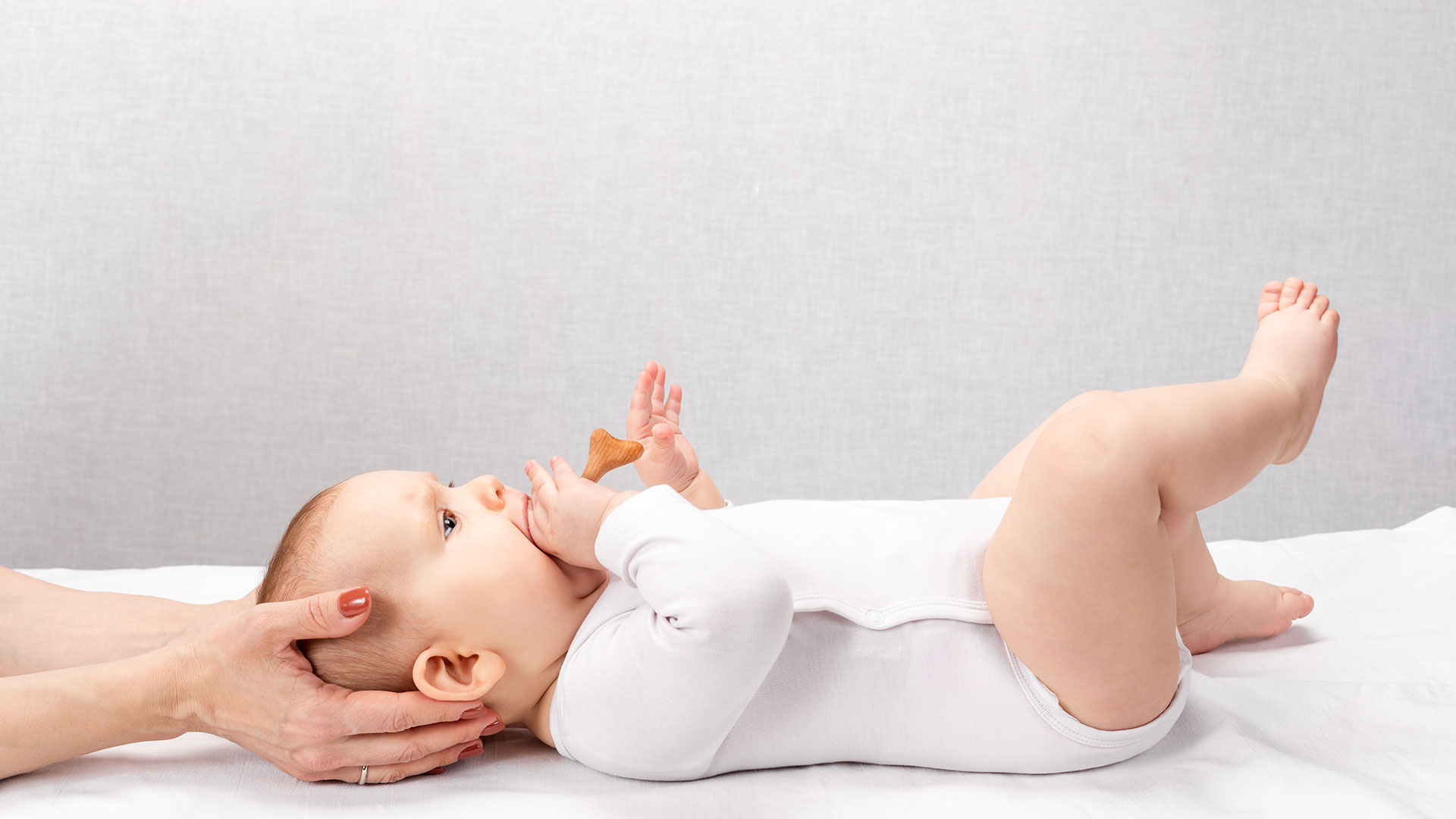Pregnancy and childbirth can cause mobility disorders in adulthood. Learn how Paediatric Osteopathy can help and when to seek it.
Some of the most common problems during childhood, such as discomfort, pain, postural irregularities, respiratory or gastrointestinal difficulties, have their origin in factors as simple as the natural pressures exerted on the baby's skull during pregnancy or childbirth. Paediatric Osteopathy seeks out areas where balance was compromised and relieves compression of nervous structures. Discover more about this specialty that has grown in recent years and where significant results are observed after the first sessions.
What is Paediatric Osteopathy?
Paediatric Osteopathy is a specialty of osteopathy that aims to prevent, diagnose, and treat mobility restrictions in the tissues and anatomical structures of infants, children, and adolescents. It has been recognized by the Ministry of Health since 2017 and is widely practiced throughout Europe.
It is an integral system of treatment using manual techniques to restore the necessary balance to normalize the body's different functions. Paediatric Osteopathy is based on the underlying principle that the human body is an integrated system, viewed as a whole; no part can be considered in isolation. When all systems are in balance, the body has the necessary conditions for self-regeneration.
Paediatric Osteopathy uses very gentle and strategically located contacts to restore balance in the muscular, articular, neural, arterial, and cranial structures, reducing the predisposition to the development of pathologies. It involves a comprehensive and in-depth knowledge of the anatomy, physiology, and biomechanics of the baby's body and is suitable for all ages between 0 and 18 years (newborns, babies, children, pre-adolescents, and adolescents).
Why is Paediatric Osteopathy necessary?
The baby's skull, being membranous, is very flexible and malleable. On one hand, this fact is advantageous because it allows the baby to adjust and pass through the birth canal during delivery. On the other hand, it also allows the skull to grow throughout the baby's development - in fact, the ossification of the skull is only complete during puberty.
However, the baby's skull is subjected to various tensions and compressions, such as intrauterine contractions, the birth canal, or even the use of auxiliary instruments such as vacuum extractors and forceps. These can cause deformations in the skull that are not always naturally corrected. In fact, changes in the shape, position, and mobility of the skull can affect vital nervous structures in the human body, resulting in conditions such as scoliosis, astigmatism, malocclusion, irritability, plagiocephaly, ear infections, persistent crying, or digestive dysfunctions.
Even babies born by cesarean section can experience cranial deformations due to the lack of intrauterine space or incorrect engagement in the maternal pelvis, making them equally predisposed to developing pathological conditions. However, it is precisely this malleability that allows Paediatric Osteopathy to act by manually correcting existing cranial deformations.
In what situations is Paediatric Osteopathy recommended?
There are various situations in which Paediatric Osteopathy is recommended at different stages and age groups - both as a preventive measure and as an intervention. A postpartum check-up of Paediatric Osteopathy is recommended, especially if forceps, vacuum extractors, or cesarean section were used.
You should seek this specialty if you notice cranial deformities or visible discomfort in the head, hair, or ears. Excessive crying, restlessness, and nervousness are other warning signs, as well as difficulties in sleeping, sucking, or reflux. You should also consider a consultation for paediatric osteopathy if you notice constipation or diarrhea, bronchiolitis, ear infections, or motor alterations such as crawling with one foot tucked under the buttocks.
In older children, any type of respiratory difficulty, postural irregularities, sleep difficulties, motor changes, or learning difficulties may benefit from Paediatric Osteopathy.
In adolescents, stress, postural irregularities, scoliosis, sports-related injuries, and headaches are the main reasons for consultation.
In the presence of these signs, the Paediatric Osteopath will conduct a comprehensive assessment of the child's clinical condition in order to understand all the conditions that may be causing pain, discomfort, or pathology. Even without visible signs or symptoms, this consultation is important as results tend to be more significant when the evaluation is done early.
What are the benefits of Paediatric Osteopathy?
Paediatric osteopathy offers various benefits for infants. The treatment consists of applying gentle manual techniques, respecting the structure and rhythm of each patient. In fact, many sessions take place while the baby plays, sleeps, or is breastfed. The child may show some discomfort or cry, not because they are in pain, but because they may not like having the hands of an unfamiliar person on their head or obstructing their field of vision.
Paediatric Osteopathy facilitates the transition from intrauterine life to the outside world by correcting any damage caused by the natural pressures of pregnancy and childbirth. By balancing tensions in different tissues (bones, tendons, muscles, and fascia), it treats mobility restrictions and eliminates discomfort and pain, resulting in a sense of well-being. It also has a preventive action on subsequent developmental problems by restoring balance to structures and systems that, when left untreated, can lead to clinical complications.
Additionally, parents receive support and advice, sharing up-to-date clinical and therapeutic information. A strong working alliance is created, contributing positively to the health of their children.
Joaquim Chaves Saúde, experts in Paediatric Osteopathy
Medicine has benefited from significant scientific advancements, which are also reflected in the clinical approach to infants. It is now possible to provide specialized attention to all factors that impact comfort and quality of life from birth onwards.
This is the mission of Paediatric Osteopathy at Joaquim Chaves Saúde, with a global and preventive perspective on children's health. We help make the first months of your baby's life more peaceful, with positive therapeutic consequences throughout their development into adulthood. This specialty is available at the Miraflores Clinic, where you will find a highly specialized and experienced team of physiotherapists to provide close and effective care. Book your session now.
